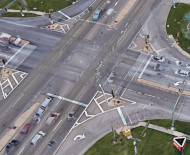9/18/2018
Illinois Appellate Court Declares Wide Left Turns LegalIllinois Appellate Court says police cannot stop motorists for making wide left-hand turns.

Police officers often enforce best practice traffic rules thinking they are upholding the law. The Illinois Appellate Court on Friday ruled that when Bloomington Police Officer Manuel Hernandez stopped motorist Donald P. Walker for making a wide left-hand turn on July 20, 2017, the policeman was the one violating the law.
Officer Hernandez had been following Walker on Hershey Road as he stopped for a red light, waiting in the dedicated left-hand turn lane. Once the light turned green, Walker proceeded into the rightmost lane of the two westbound lanes on Empire Street. The officer believed the the law forced drivers to only choose the leftmost lane.
"When there's two lanes, [the legal requirement is] to stay in the closest lane in case -- like in that intersection, going south on Hershey, you have a turning lane to go east, another one to go directly south, and I believe a third lane that gives you an option to go directly south, and make a turn to go west on Empire," Officer Hernandez testified.
Prosecutors insisted that this was the safest way to drive, but Walker's attorney countered that there was no evidence at all that his wide turn put anyone in danger. The three-judge appellate panel resolved the question by dissecting the language of the statute.
"Whenever practicable the left turn shall be made in that portion of the intersection to the left of center of the intersection," Illinois Code Section 11-801(a)(2) states.
The judges did not find this sentence ambiguous in any way.
"For this court to agree with the state's interpretation of this subsection, we would have to depart from the plain language of the statute by reading into the statute exceptions, limitations, or conditions the legislature did not express, and we would have to deem other parts of the statute superfluous," Judge John W. Turner wrote. "This court would have to determine the legislature intended for the last sentence of subsection (a)(2) to be read to restrict what lane a driver could exit an intersection -- without any language in the sentence to that effect."
Because the legal mistake the officer made was obvious, the court ordered the evidence uncovered during the traffic stop to be suppressed.
"Our supreme court noted a police officer who is acting in defiance of the plain language of an existing statute or judicial order -- instead substituting his own erroneous interpretation of the statute or decision -- cannot be considered as acting in an objectively reasonable manner," Judge Turner concluded.
A copy of the ruling is available in a 60k PDF file at the source link below.


